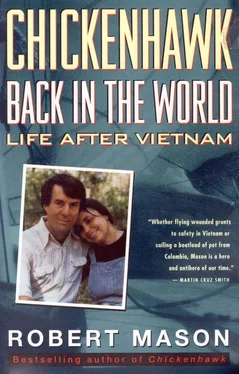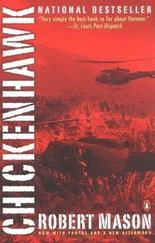Robert Mason - Chickenhawk - Back in the World - Life After Vietnam
Здесь есть возможность читать онлайн «Robert Mason - Chickenhawk - Back in the World - Life After Vietnam» весь текст электронной книги совершенно бесплатно (целиком полную версию без сокращений). В некоторых случаях можно слушать аудио, скачать через торрент в формате fb2 и присутствует краткое содержание. Год выпуска: 2013, Издательство: BookBaby, Жанр: Старинная литература, на английском языке. Описание произведения, (предисловие) а так же отзывы посетителей доступны на портале библиотеки ЛибКат.
- Название:Chickenhawk: Back in the World - Life After Vietnam
- Автор:
- Издательство:BookBaby
- Жанр:
- Год:2013
- ISBN:нет данных
- Рейтинг книги:3 / 5. Голосов: 1
-
Избранное:Добавить в избранное
- Отзывы:
-
Ваша оценка:
- 60
- 1
- 2
- 3
- 4
- 5
Chickenhawk: Back in the World - Life After Vietnam: краткое содержание, описание и аннотация
Предлагаем к чтению аннотацию, описание, краткое содержание или предисловие (зависит от того, что написал сам автор книги «Chickenhawk: Back in the World - Life After Vietnam»). Если вы не нашли необходимую информацию о книге — напишите в комментариях, мы постараемся отыскать её.
Chickenhawk: Back in the World - Life After Vietnam — читать онлайн бесплатно полную книгу (весь текст) целиком
Ниже представлен текст книги, разбитый по страницам. Система сохранения места последней прочитанной страницы, позволяет с удобством читать онлайн бесплатно книгу «Chickenhawk: Back in the World - Life After Vietnam», без необходимости каждый раз заново искать на чём Вы остановились. Поставьте закладку, и сможете в любой момент перейти на страницу, на которой закончили чтение.
Интервал:
Закладка:
“What about the missing five hundred pounds of pot?” I said.
“What?” Bowling said.
“Well, we had thirty-five hundred pounds on board. They claim we had three thousand.”
Bowling shrugged. “Well, two things: can you prove you had that much and do you want to increase the severity of your crime by doing so?”
“The count was an estimate,” John said. “We can’t prove how much we had.”
“Nor would you want to,” Bowling said. “Let it be, gents.”
We talked for about a half hour. John told Bowling about Ireland, wanted to know if he could get him taken care of. Bowling said he’d look into it. John said, “Great. And can you lend us ten bucks?”
Bowling smiled, got a bill out of his pocket, and handed it to John. “What’re you going to buy here?”
“Cigarettes, candy, coffee,” John said. “This place is the pits. They serve actual swill for meals. And look what they give us to wear.”
“Hey, boys,” Bowling said, “you guys are in jail in Charleston County, South Carolina. What do you expect?”
“How long?” John said.
“I’ll have you out in four, five days. No problem.”
They took Bob to a local hospital. He had a bad intestinal infection and stayed there overnight. When he came back the next night, he was pale but smiling. John and I gave him a box of instant-coffee packets we’d bought.
That night, at one in the morning, I woke up because somebody was pounding my shoulder. I looked up and saw a big black man, the guy we first met, leaning over me. He said, “Hey. You got any cigarettes?”
I fished out my pack from my pants pocket and handed it to the guy. He took about half the pack and returned the rest. “Light?” I handed him a book of matches and watched the flame light up his face. He was enjoying this. He threw me the matches and walked out of our cell.
We settled into a routine for the next few days. Time was measured by the passage of meals. Breakfast was usually watery grits, an egg, white toast. Lunch was often cold cuts and two slices of white bread. Dinner was invariably rice with some kind of meat: a hot dog, a hamburger patty, a piece of chicken. Between meals, I read. They had a short shelf of books including about ten Horatio Homblower novels. I’d never read them, so I did now. I read every waking moment so I wouldn’t have to think about being in a cage.
Two days later we were taken out of our cell, given our old clothes, which now really smelled like street garbage, and driven back to the courthouse to see the magistrate.
The magistrate set our bonds at one hundred and fifty thousand dollars each. Bowling objected, jumped up and said that the state of South Carolina had set our bonds for these same crimes at ten thousand dollars. A hundred and fifty thousand, Your Honor? As our hired advocate, Bowling put on a great show, turned to us and pointed out what nice-guys-gone-wrong we were (white, college-educated, middle class). The magistrate sighed, agreed to reduce our bonds to only seventy-five thousand each.
Seventy-five thousand dollars was much more money than I could understand. Bowling, in a private meeting at the courthouse, said that our friends wanted us to try to come up with the money ourselves because it would look bad if we just handed over that kind of cash. “They’d think you were part of some big organized crime syndicate or something.”
“Organized? Nobody’d ever accuse us of that if they knew these assholes,” I said.
So I called Patience and told her to try to raise money on our property. That was just wishful thinking. It was possible our ten acres were worth that much, but we owed over half that on our mortgage. The house—or rather, the unfinished cabin—was worth maybe ten thousand. Patience called my father.
Dad had come to my rescue when I had my car wreck in Portugal, and now he came through again. He agreed to guarantee my bond by putting up his condominium as security.
Bowling came to see us every day. One day he brought a document the government wanted us to sign, an inventory of the property confiscated on the Namaste. The list was surprising for the things not listed.
“Hey,” John said, “half the stuff we had with us isn’t even on here.”
Bowling shrugged. “They’ll insist it wasn’t there.”
“They can do that?”
“Sure. Who do you think the judge’ll believe? You or them?”
The loran wasn’t listed, which was fine with me. I wished them a long trip in bad weather with that loran. Any of the boat’s stuff was fair game, I figured. But these guys had taken my shoes, my knife, my calculator, my notebook, and my camera, none of which was on the list. “I don’t care about anything they got,” I told Bowling, “except for my notebook and my camera.”
“What’s so special about them?”
“The notebook is important. I was making notes for my books.”
“Yeah?” Bowling said. “You’re a writer?”
“Yeah. When I’m not smuggling, I try writing.”
Bowling laughed. “And the camera?”
“I had that during my whole tour in Vietnam. It’s a good-luck charm. I have to have it back.”
Bowling nodded. “I’ll check on it.”
“And we just ignore that they took all our stuff?” John said.
“That’s right,” Bowling said. “You start making noises about them stealing your personal stuff, and they’ll be all over you like stink on shit. Let it be.”
Let it be. Play the game nicely and maybe they won’t play hardball.
Captain Horatio Hornblower was blasting the living shit out of a native village on some foreign shore with cannon fire from his ship when Porter yelled, “Mason.”
“Yo.” I never said “Yo” to anybody before I became a criminal.
“Cop here to take you to the courthouse.”
John said, “What about Tillerman and Ireland?”
Porter shook his head.
I got up, breathless. Was it possible? Was I actually getting out of here?
Porter waited while I put my clothes back on for the second time and escorted me up to the reception area. The black deputy who had brought us here was waiting for me by the front door.
“Hello, Mason,” he said, wrinkling his nose. “Well, you got a shave, but you still smell like shit.”
I nodded. The deputy got out his handcuffs and cuffed me before we walked out to the car. Just regulations, he reminded me.
We said nothing during the twenty-minute ride to town.
A woman on the elevator at the courthouse glanced at me once on the ride up to the third floor. She quickly looked away. I was a stinking, handcuffed beast.
The elevator door opened and the first person I saw was my father. He stood in the hall smiling widely when he saw me. I couldn’t move my face for fear I would burst into tears and humiliate myself and him. I was in shock. I followed the deputy and just stared at my dad when we walked by him. His face dropped when he saw the grief on mine.
The magistrate said the deputy could take off my cuffs. I sat down while he explained that my dad had put up his apartment for my bail and what that meant. If I broke any of the provisions of my bail, the government would seize my parents’ property. Did I understand?
I nodded.
Would I agree to the restrictions of the bail? No travel outside my county without direct permission from him?
I said yes.
“Okay,” he said. “The police will take you back to the jail so you can be processed out.”
“Back to jail?” I said.
“Yes. To be out-processed.”
“Oh.”
The deputy had to do something else, and while I waited for another cop, they put me in the holding cell down the hall. I paced around the cell for an hour, pissed off. I was technically free—why was I locked up?
Читать дальшеИнтервал:
Закладка:
Похожие книги на «Chickenhawk: Back in the World - Life After Vietnam»
Представляем Вашему вниманию похожие книги на «Chickenhawk: Back in the World - Life After Vietnam» списком для выбора. Мы отобрали схожую по названию и смыслу литературу в надежде предоставить читателям больше вариантов отыскать новые, интересные, ещё непрочитанные произведения.
Обсуждение, отзывы о книге «Chickenhawk: Back in the World - Life After Vietnam» и просто собственные мнения читателей. Оставьте ваши комментарии, напишите, что Вы думаете о произведении, его смысле или главных героях. Укажите что конкретно понравилось, а что нет, и почему Вы так считаете.












